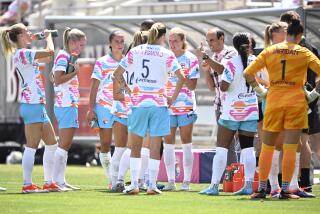âPatience is critical, because you donât go from the baement to the penthouse without climbing up a whole lot of stairsâ
San Diego State womenâs basketball coach Beth Burns recently completed her first season as head coach with the Aztecs. But just a few years ago, when the 31-year-old from Chatham, N.J., competed in college, womenâs sports were almost an afterthought. She was a four-year starting forward for Ohio Wesleyan basketball team who was named the most outstanding female athlete. Burns participated when women athletes still competed in the Assn. of Intercollegiate Athletics for Women and full athletic scholarships were virtually unheard of. Working her way through school while playing basketball and attending class full time, she earned her bachelorâs degree in physical and health education in 1979 and a masterâs in physical education and psychology in 1981 from Ohio State, while she was an assistant coach there. Burns went on to become an assistant coach at University of Colorado and North Carolina State before coming to SDSU. Burns spoke with Times staff writer Terry Rather in her SDSU office and was photographed by Vince Compagnone.
In 1975 there were just the rumblings, the beginnings of scholarships for women. Iâd like to think Iâm not that old at 31, but itâs incredible and rewarding to me to see the strides we have made in terms of full scholarships for women. At the time I went to college, I got up, went to school, went to practice and worked in the kitchen. And I took out loans to go to college. So I do appreciate the value of an education.
And Iâve always been interested in athletics. I grew up in a family that was always athletic. I was surrounded by sports as far as I remember. Thereâs pictures of dad and me with a whiffle ball when I was 4 years old. If there was a tree, Iâd climb it. If there was a ball, Iâd throw it. Growing up, athletics was everything. We played kickball, soccer, field hockey, volleyball, anything that was there we did.
My parents really inspired me. My dad, who still lives in Chatham, has been from the start very supportive, open-minded and encouraging for my sister and me. When they wouldnât let us play Little League, heâd get out there and start a league and help us get involved. He never said, only girls can do that, or only boys can do that. He said, you can do whatever you want to do. My mother was a source of strength for me. She died when I was 18, which really affected me. If anyone was to ask me what was the most devastating thing that ever happened in my life, that would be it. Both of my parents encouraged me to be successful.
When I went to grade school, we didnât have any organized teams for girls, so I didnât really play anything competitively until high school. We just played. There really was nothing organized until they started a local fast-pitch softball league.
When I started playing organized basketball in high school, it was just beginning for girls at my high school. They had just started giving you someone who was a coach and not someone who just sat on the side of the gym and kept it open from 3 to 4 p.m. and on game day give you a penny and youâd play. This was frustrating. I didnât have any coaching. I wanted to be good, I wanted to learn and I wanted my team to be good because I was so competitive. Weâd practice for a half-hour and no one knew what they were doing. We were kind of like the âBad News Bears.â We lived through those losing seasons, but I think, if anything, it made me want to be a coach.
When I first got to college, I wanted to be a high school coach. But as soon as I got there, I wanted to be a college coach. I think it was because I didnât have people who were really coaches until the fast-pitch softball league. A couple of the firemen started up a fast-pitch softball team and they were real coaches. They yelled at us and they made us do what we had to do.
If you zigged instead of zagged, they told you about it. It was never, âItâs OK because youâre girls and it doesnât matter.â I loved it, there was someone who was coaching us, pushing us. You would have thought we were playing for a national championship.
I found that the biggest transition from player to coach was youâre used to doing things physically. When you see a problem, you go out and do something about it, you go out and play. The hardest thing is to stop doing it with your body and start with your brain. When I first got out of college, I needed a seat belt on the bench.
Iâm thrilled with this opportunity at SDSU. I think it will take hard work and the bricks are already starting to be laid. Patience is critical, because you donât go from the basement to the penthouse without climbing up a whole lot of stairs. I want to build a program here. I donât want to have a good team 1990-91. I want to have a good program for the rest of the time Iâm here.
More to Read
Go beyond the scoreboard
Get the latest on L.A.'s teams in the daily Sports Report newsletter.
You may occasionally receive promotional content from the Los Angeles Times.










